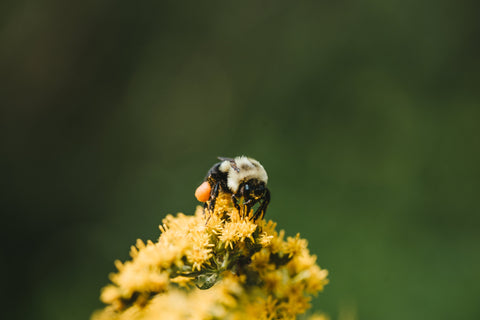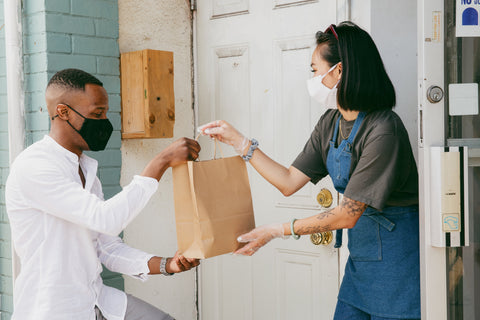Bees – they’re cute although a little scary. Sure, they’re only small, but they sting. So you kill one without thinking – a quick slap, and bang! They’re gone. No harm done. Better than getting stung, right? `
Wrong. It turns out a lot of harm will be done without those cute little stingers, because bees are a vital part of our day-to-day life. And we don’t mean vital like watching Netflix on a Friday night – we mean crucial to our ecosystem.
Why? Great question. Here’s the bee-down.
YOUR MORNING COFFEE & SMASHED AVO BROUGHT TO YOU BY BEES
Do you enjoy a morning coffee? Same. Who doesn’t! It’s part of the Aussie way of life. But did you know that bees make that possible? That’s right – coffee trees rely on pollination from bees.
Without it naturally occuring, we’ll have to rely on manual pollination. Picture a lot of people on ladders, brushing pollen onto plants. It’s already happening to pear farmers in China (yep, they’re becoming literal worker bees).
And coffee trees aren’t the only ones. It’s estimated that one third of the human food supply comes from crops that are dependent on pollination by bees.
A quick refresher on pollination for anyone who wasn’t listening in science class: Pollination is how plants reproduce. Insects, like bees, bring the female organs of a plant, to the male. And why is reproduction important? It’s how all species continue to exist.
Foods such as avocados, pumpkin, broccoli, onions, cucumbers, citrus fruit, a variety of nuts and beans, peaches, berries, cherries and grapes (just to name a few!) rely on pollination. That’s right – your smashed avo every Sunday morning is brought to you by bees. (As is your Saturday night wine.)
“Worldwide, approximately 1,000 plants grown for food, beverages, fibers, spices, and medicines need to be pollinated by animals in order to produce the goods on which we depend.”
– The Pollinator Partnership
HONEY, I’M HONEYCOMB!
And, of course, the food most impacted by bees: honey. Honey bees, although not native to Australia, have become a vital part of our ecosystem and food industry.
Firstly, they produce honey. Imagine a world without honey, honeycomb and Crunchies! I don’t want to – my morning porridge just got a lot less appealing.
But honey bees don’t just produce honey – they’re big pollinators. Among the many plants they pollinate are clover and alfalfa, which are fed to cattle. And I think you can work out which industry cattle is vital too (hint: you wouldn’t be eating a meat lover’s pizza without it).
Even when honey bees aren’t pollinating, they’re increase biodiversity in the area – a fancy way of saying that they’re good for our air, water, and food.
AUSTRALIAN MADE
It’s not just humans and food crops that rely on pollination – animals, trees and wildlife do too, particularly native Australian trees and shrubs.
Many members of the Myrtaceae family – which includes eucalypts, angophoras and tea trees – rely on native bees to pollinate. And who eats eucalyptus? They’re cute, cuddly and inspired Blinky Bill.
We produce some of the most unique and beautiful flora and fauna, and many of them rely on pollination, and our bees, just as we do. It’s an ecosystem, you see? (Think Lion King’s Circle of Life.)
THE REAL WORKER BEES CONTRIBUTING TO OUR ECONOMY
The term “worker bee” originated somewhere and I think by now you can work out where. Bees work hard. So hard, in fact, that they contribute to our economy.
A quick summary of their daily duties:
- Pollinating plants that produce fruit and vegetables
- Pollinating seeds and plants that other birds and mammals eat
- Pollinating flowers
- Pollinating trees
- Gathering nectar
- Producing honey (meaning wax, honeycomb etc)
- Guarding the hive and keeping it clean
- Looking after the Queen Bee (no, not Beyoncé – the literal Queen Bee)
As a result of their hard work, honey and other products produced by hives are estimated to generate $100 million per year in Australia. While nearly two-thirds of our agricultural production benefits from honey bee pollination – when last evaluated in 2017, it was valued at $19 billion. Not to mention all the economically important crops – such as fruits, vegetables, textile-related fibers and medicinal products – which rely on pollination.
Yep, that’s right. Those bees are probably contributing more to our economy than we are! You’re regretting killing that bee without thinking now, aren’t you?
Luckily, you can make up for it by putting your bees and honey where you mouth is. Support the industry, and buy bee-based products that promote safe bee farming.
Please? Australia needs their morning coffee and smashed avo.
References:
10 Reasons Why Bees Are Important


